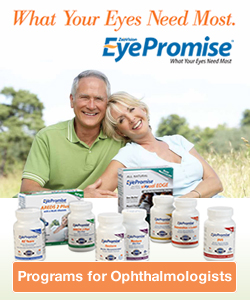 |
|
August 2013, Issue 60
Why Do Anti-VEGF Agents Not Work in All Patients with Neovascular AMD?
 |
Vera K. Schmit-Eilenberger, MD
Department of Ophthalmology
Städtisches Klinikum Karlsruhe
Karlsruhe, Germany
|
 |
Albert J. Augustin, MD
Department of Ophthalmology
Städtisches Klinikum Karlsruhe
Karlsruhe, Germany |
Age-related macular degeneration (AMD) is the most common cause of legal blindness in industrialized countries. Most cases of severe vision loss from AMD are due to the neovascular, or "wet", form of the disease. The vision outcomes of patients with wet AMD have improved significantly with the use of anti-vascular endothelial growth factor (anti-VEGF) therapy.1-4 However, there are non-responders and suboptimal responders to anti-VEGF treatment, and the question arises as to why some patients respond favorably to anti-VEGF therapy and some do not.
The etiology of wet AMD is multifactorial.5 Known steps in the development of "wet AMD" include drusen formation with concomitant thickening of Bruch's membrane, reduced transport of nutrients and waste products, ischemia, inflammation6-10 and, finally, the development of choroidal neovascularization (CNV). It has been reported that macular degenerative changes may be induced by an inappropriate response to inflammation caused by polymorphisms of the complement factor H (CFH) gene; under normal conditions, CFH inhibits the complement system.6-9 Further downstream, several cytokines are expressed, with VEGF being one of the key molecules involved in the development of CNV.11
When questioning why anti-VEGF agents do not work in all patients with neovascular AMD, there are several factors to consider:
1. Inflammation
There is growing evidence that inflammation is one of the key events occurring upstream in the cascade of events leading to neovascular AMD. This has been supported by trials showing that topical anti-inflammatory therapy, with or without the administration of anti-VEGF therapy, is able to suppress the development of neovascular AMD.12-14 In another study of patients with neovascular AMD unresponsive to anti-VEGF monotherapy, combination therapy of anti-VEGF with triamcinolone acetonide was reported to be effective.15
2. Genetics
In one recently published study, single nucleotide polymorphisms (SNPs) in the VEGF-A gene were studied. Patients with particular SNPs showed a significantly better visual outcome and a higher probability of responding to anti-VEGF therapy.16 In another retrospective study of 150 patients, there was no statistically significant association between the response to anti-VEGF therapy and known high risk disease loci.17 In yet another study, individuals with a particular polymorphism of the CFH gene had a decreased chance of visual acuity improvement after intravitreal anti-VEGF therapy.18
3. Level of CNV maturation
Another potential contributing factor associated with responsiveness to anti-VEGF therapy is the level of CNV maturation. "Mature" vessels in CNV have been reported to be covered with pericytes, thereby making the vessels less accessible to antibodies. Such "mature" CNV lesions have been reported to respond better to combination treatments or aflibercept, with the latter phenomenon being yet unexplained.19-22
4. Type of neovascular lesion
It has been reported that retinal angiomatous proliferation (RAP)23-25 and CNV associated with polypoidal choroidal vasculopathy (PCV)26,27 respond less favorably to anti-VEGF therapy compared to AMD-associated CNV.
5. Timing of treatment related to disease course
The later in the disease course that anti-VEGF therapy is initiated, the less favorable the visual outcomes may be. For example, if treatment is not initiated until substantial fibrosis and scarring have occurred, there is already significant damage to the tissues which anti-VEGF therapy cannot reverse.
6. Vitreomacular traction
It has been reported that vitreomacular attachment is associated with the development of neovascular AMD.28 Tractional forces and the adhesion, which may act as a semi-permeable membrane, may inhibit the effect of anti-VEGF medications.29
Although intravitreal anti-VEGF therapy has been associated with a dramatic improvement in the vision outcomes associated with neovascular AMD, some patients are unresponsive, or suboptimally responsive, to anti-VEGF treatment. Understanding the factors that may contribute to suboptimal anti-VEGF treatment responsiveness is important to guide research for future therapies. In addition, earlier identification of patients with neovascular AMD may improve final vision outcomes. Finally, identification of patients at high risk of developing neovascular AMD may lead to strategies for prevention.
References:
1. Gragoudas ES, Adamis AP, Cunningham ET Jr, Feinsod M, Guyer DR. Pegaptanib for neovascular age-related macular degeneration, VEGF Inhibition Study in Ocular Neovascularization Clinical Trial Group. N Engl J Med. 2004 Dec 30;351(27):2805-16.
2. CATT Research Group, Martin DF, Maguire MG, Ying GS, Grunwald JE, Fine SL, Jaffe GJ. Ranibizumab and bevacizumab for neovascular age-related macular degeneration. N Engl J Med. 2011 May 19;364(20):1897-908.
3. Ohr M, Kaiser PK., Aflibercept in wet age-related macular degeneration: a perspective review. Ther Adv Chronic Dis. 2012 Jul;3(4):153-61.
4. Holash J, Davis S, Papadopoulos N, Croll SD, Ho L, Russell M, Boland P, Leidich R, Hylton D, Burova E, Ioffe E, Huang T, Radziejewski C, Bailey K, Fandl JP, Daly T, Wiegand SJ, Yancopoulos GD, Rudge JS. VEGF-Trap: a VEGF blocker with potent antitumor effects. Proc Natl Acad Sci U S A. 2002 Aug 20; 99(17): 11393-8.
5. Klein R, Peto T, Bird A, Vannewkirk MR. The epidemiology of age-related macular degeneration. Am J Ophthalmol. 2004;137:486-95.
6. Klein RL, Zeiss C, Chew EY, et al. Complement factor H polymorphism in age-related macular degeneration. Science. 2005;308:385-9.
7. Edwards AO, Ritter R 3rd, Abel KJ, et al. Complement factor H polymorphism and age-related macular degeneration. Science. 2005;308:362-4.
8. Haines JL, Hauser MA, Schmidt S, et al. Complement factor H variant increases the risk of age-related macular degeneration. Science. 2005;308:419-21.
9. Hageman GS, Anderson DH, Johnson LV. A common haplotype in the complement regulatory gene factor H (HF1/CFH) predisposes individuals to age-related macular degeneration. Proc Natl Acad Sci USA 2005;102:7227-32.
10. Hollyfield JG, Bonilha VL, Rayborn ME, et al. Oxidative damage-induced inflammation initiates age-related macular degeneration. Nature Med. 2008;14:194-8.
11. Ferrara N, Gerber HP, LeCouter J. The biology of VEGF and its receptors. Nature Med. 2003;9:669–76.
12. Izumi-Nagai K, Nagai N, Ohgami K, et al. Inhibition of choroidal neovascularization with an anti-inflammatory carotenoid astaxanthin. Invest Ophthalmol Vis Sci. 2008;49:1679-85.
13. Gomi F, Sawa M, Tsujikawa M, Nishida K. Topical bromfenac as an adjunctive treatment with intravitreal ranibizumab for exudative age-related macular degeneration. Retina. 2012;32:1804-10.
14. Flaxel C, Schain MB, Hamon SC, Francis PJ. Prospective randomized controlled trial of combination ranibizumab (Lucentis) and bromfenac (Xibrom) for neovascular age-related macular degeneration: a pilot study. Retina. 2012;32:417-23.
15. Veritti D, Sarao V, Lanzetta P. Bevacizumab and triamcinolone acetonide for choroidal neovascularization due to age-related macular degeneration unresponsive to antivascular endothelial growth factors. J Ocul Pharmacol Ther. 2013;29:437-41.
16. Abedi F, Wickremasinghe S, Richardson AJ, et al. Variants in the VEGF-A gene and treatment outcome after anti-VEGF treatment for neovascular age-related macular degeneration. Ophthalmology. 2013;120:115-21.
17. Orlin A, Hadley D, Chang W, et al. Association between high-risk disease loci and response to anti-vascular endothelial growth factor treatment for wet age-related macular degeneration. Retina. 2012;32:4-9.
18. Kloeckener-Gruissem B, Barthelmes D, Labs S, et al. Genetic association with response to intravitreal ranibizumab in patients with neovascular AMD. Invest Ophthalmol Vis Sci. 2011; 52:4694-702.
19. Helfrich I, Scheffrahn I, Bartling S, et al. Resistance to antiangiogenic therapy is directed by vascular phenotype, vessel stabilization, and maturation in malignant melanoma. J Exp Med. 2010;207:491-503.
20. Pachydaki SI, Jakobiec FA, Bhat P, et al. Surgical management and ultrastructural study of choroidal neovascularization in punctate inner choroidopathy after bevacizumab. J Ophthalmic Inflamm Infect. 2012; 2:29-37.
21. Sarks JP, Sarks SH, Killingsworth MC. Morphology of early choroidal neovascularisation in age-related macular degeneration: correlation with activity. Eye. 1997;11:515-22.
22. Lu C, Thaker PH, Lin YG, et al. Impact of vessel maturation on antiangiogenic therapy in ovarian cancer. Am J Obstet Gynecol. 2008; 198:477.e1-9; discussion 477.e9-10.
23. Heussen FM, Ouyang Y, Joussen AM. Retinal angiomatous proliferations. Klin Monbl Augenheilkd. 2012; 229:877-81.
24. Hemeida TS, Keane PA, Dustin L, et al. Long-term visual and anatomical outcomes following anti-VEGF monotherapy for retinal angiomatous proliferation. Br J Ophthalmol. 2010; 94:701-5.
25. Wolf A, Kook D, Kreutzer T, et al. Anti-VEGF treatment for retinal angiomatous proliferation. Ophthalmologe. 2008; 105:845-51.
26. Coppens G, Spielberg L, Leys A. Polypoidal choroidal vasculopathy, diagnosis and management. Bull Soc Belge Ophtalmol. 2011;317:39-44.
27. Gomi F, Tano Y. Polypoidal choroidal vasculopathy and treatments. Curr Opin Ophthalmol. 2008;19:208-12.
28. Jackson TL, Nicod E, Angelis A, et al. Vitreous attachment in age-related macular degeneration, diabetic macular edema, and retinal vein occlusion: a systematic review and metaanalysis. Retina. 2013;33:1099-108.
29. Mojana F, Cheng L, Bartsch DU, et al. The role of abnormal vitreomacular adhesion in age-related macular degeneration: spectral optical coherence tomography and surgical results. Am J Ophthalmol. 2008;146:218-27.
|
|

Ingrid U. Scott,
MD, MPH, Editor

Professor of Ophthalmology and
Public Health Sciences,
Penn State College of Medicine
|

|
| |
|







